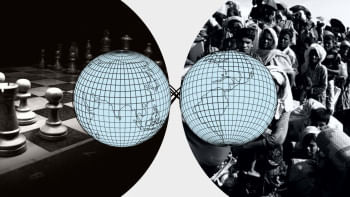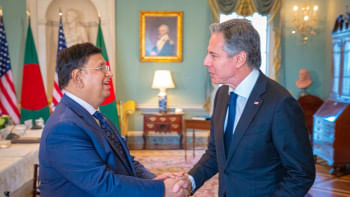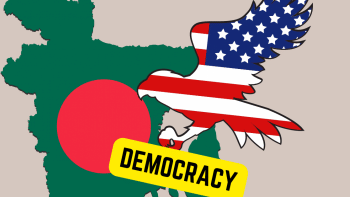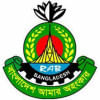Was the US visa policy against undemocratic actors necessary?

Recently, the media environment in Bangladesh has been up in arms regarding the potential of upcoming US sanctions. Now it seems that the rumours and hearsay being spread on social media and the tabloids had an element of truth after all. On 24 May, the US Secretary of State Antony J Blinken announced a new visa policy "to Promote Democratic Elections in Bangladesh."
By now, the news has been disseminated far and wide, and many interest groups are spinning the story to fit their own narratives and political agendas. I had the privilege of interviewing the US Assistant Secretary of State, Donald Lu, just hours after the statement was made in order to clarify the message being sent. And the very first question I asked was, "Was it necessary?"
I believe I have an answer to this question and an understanding of the intent behind this diplomatic action, based on the wording of the statement, the interview with Donald Lu, and the recent usage of the Immigration and Nationality Act (referred to in the official statement) by the US in Bangladesh and other countries.
First, however, it is urgent to identify what this new policy is not: it is not a "sanction".
Additionally, according to the assistant secretary of state, this new policy is definitely not in favour of any particular political party or group. "This policy will be applied equally to members of government and to members of opposition," Donald Lu stated. He also proceeded to give examples of how the act will apply to opposition party members if it is found that they had been involved in violence to undermine elections or voter intimidation.
Donald Lu also clarified that the act is not retaliation for any kind of decision or statement made by the government of Bangladesh or by members of the ruling party. The official details of the new policy were revealed to the government even before the prime minster went on her visit to London and gave the much-discussed interview with BBC. Other provocative actions on the part of Bangladesh, such as the prime minister's statement about a response to sanctions on May 13, as well as the revocation of the additional security detail to the US ambassador and the ambassadors of three other nations on May 15, are now recontextualised in light of the fact that the government already knew that this new visa policy was coming.
The official press release identified four key methods of undermining democratic elections: vote rigging, voter intimidation, the use of violence to prevent people from exercising their right to freedoms of association and peaceful assembly, and the use of measures designed to prevent political parties, voters, civil society, or the media from disseminating their independent views.
The assistant secretary of state also made it clear that the policy is not ex post facto, which means that the new visa policy will not retrospectively affect individuals who are alleged to have committed actions to undermine democratic elections in the past. As Donald Lu stated, "This is a forward-looking policy, meaning that our hope is that this policy will help prevent violence and promote a free and fair election this coming year in Bangladesh."
Regarding whom the visa policy will particularly target, Donald Lu made it clear that the policy will not target institutions, as visas are only issued to individuals. However, he added that the policy will target immediate family members of perpetrators, meaning spouses and children. This little detail should strike fear into the hearts of the true targets of this policy: those with families living, working or studying in the US, who think they can get away with undermining democratic elections without repercussions. Although the US will not publish any list of individuals whose visas are revoked or blocked, the person whose visa is affected will be informed immediately.
Perhaps the most crucial point to note is that the policy will target both those individuals who give orders to undermine the democratic election process and those who follow those orders. The official press release identified four key methods of undermining democratic elections: vote rigging, voter intimidation, the use of violence to prevent people from exercising their right to freedoms of association and peaceful assembly, and the use of measures designed to prevent political parties, voters, civil society, or the media from disseminating their independent views.
The wording of the press release is quite similar to the statement made by the US Department of State on February 25, 2022 addressing individuals in Somalia during the 2022 Somali presidential election, as well as the statement made on May 24, 2023 addressing individuals in Nigeria during the Nigerian presidential election. The common trend is the utilisation of Section 212(a)(3)C) of the Immigration and Nationality Act in all three cases. The main difference is that in the case of Bangladesh, the policy was preemptively announced before the election process and serves more as a warning than punishment. Another key distinguishing point in the Bangladesh visa policy is that at least one of the four identified methods of undermining democratic elections allude directly to Bangladesh government's usage of the Digital Security Act (DSA) in suppressing dissenting views, such as how the act was used against national daily Prothom Alo on March 29, 2023.
Therefore, as both the people who give orders and the people who follow those orders will be targeted, bad actors who are filing DSA charges, the police force who are carrying out arrests, and also members of the justice system who are complicit in abusing the DSA can be subjected to the clauses of the new visa policy.
Implications
In a world where sanctions are being increasingly seen as counterproductive, this new form of diplomatic pressure sends a strong message without hampering the livelihoods of the common people. The message between the lines is that the US is keeping a very close eye on Bangladesh at the moment. It also underscores Bangladesh's current importance in the broader geopolitical environment of the Indo-Pacific.
This kind of diplomatic browbeating is most definitely not a good look for Bangladesh. But what should have been a matter of national shame turned out to be a policy mostly welcomed by the common people, if we go by the overflow of positive reactions on social media in response to the press statement.
There is precedent for this adulation. Previous stern diplomatic action from the US came in the form of individual sanctioning of prominent officers of the Rapid Action Battalion (RAB), and of course against the organisation itself under the Global Magnitsky Act. As a result, we have seen a drastic fall in the number of enforced disappearances and extrajudicial killings in the last year. Perhaps the people are hoping to see a similar positive effect stemming from this new policy.
Two key questions regarding the policy remain unanswered for the time being. The US Department of State has yet to declare how it will track undemocratic actions in Bangladesh's many urban and rural nooks and crannies during the hectic election cycle. The State Department has also not clarified what the policy will be for those with dual US-Bangladeshi citizenship and those with green cards who might be actively undermining the democratic electoral process, as the usual visa process may not apply to them.
Yet the profoundly positive reaction of the people of Bangladesh towards this policy gives us a dire reminder of the state of the nation. The people of Bangladesh are starved of hope, and they will find hope from wherever it might come. And perhaps, for that reason alone, I believe that this new policy was necessary.
Zillur Rahman is the executive director of the Centre for Governance Studies (CGS) and a television talk show host. His Twitter handle is @zillur

 For all latest news, follow The Daily Star's Google News channel.
For all latest news, follow The Daily Star's Google News channel. 











Comments